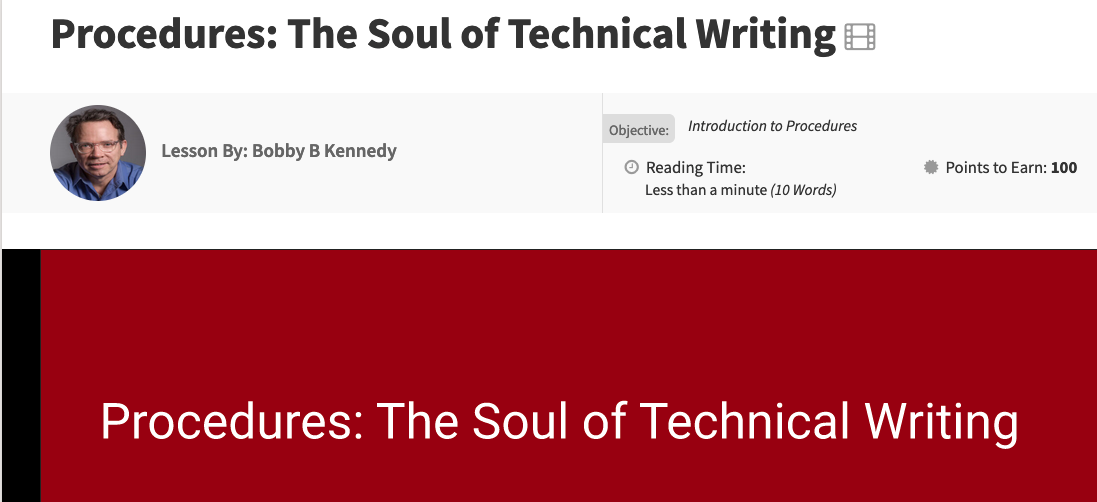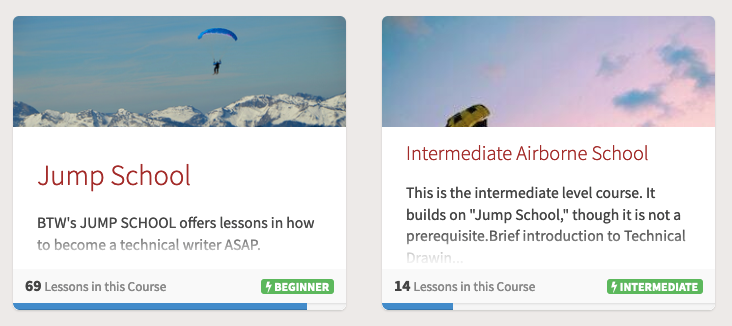Technical writing course Q&A -- 'Become a Technical Writer', with Bobby Kennedy
To learn more about the technical writing course, go directly to Become a Technical Writer.

Note: This is a sponsored post.
Technical writing courses must take a lot of time to prepare. How long have you been working on your course, and why did you create it?
Yes. Very time intensive. Hundreds of hours of work. Also beta testing with 12 testers prior to launch.
The course had been on my mind for a while. When a former employer asked me if I could tutor his daughter, a college student studying IT who wanted to intern as a tech writer, it was the perfect segue. I focused on the absolute fundamentals from my experience over 20 years as (mostly) a contractor in New York City for blue-chip firms.
I began work in the fall of 2019 and my latest update was today. I gave up my nights and weekends for some months. Then COVID hit and the business plan fell through. Fortunately, I was recruited as a tech writing manager by one of the “big four” accounting firms (for their Salesforce implementation), and they allowed me to keep my “side business.” (I aim to build up the course so I can quit my corporate job.)
Who is the target audience for this technical writing course? Students, transitioning professionals, engineers?
The target audience is primarily transitioning professionals. I find my pricing — the course is not cheap — encourages self-selection. Most have thought about it a while because they’ve done a bit of it or believe their skills line up well with tech writing.
I have had recent graduates as well. One of these landed an $80,000 position after less than a year as a technical writer. Of course, that’s not going to be the norm, but to help them get there? Immensely gratifying for me.
How is your technical writing course different from other courses online?
Technical writing is not law or architecture. We don’t need a license to practice. Which is not to say it’s trivial or easy. So what makes a technical writer? Opinions differ, but one incontrovertible truth is: If your title is technical writer and you’re paid as a technical writer, well then, you’re in.
So there’s an opportunity for me to be bold and challenge the incumbents.
I believe my main competition comes from Udemy and Coursera. I haven’t taken these courses, but my impression (from examining the curricula and reviews) is that you’ll have to stack a few of these and hope for a very supportive instructor to come close to my course.
Genuine confidence only comes from doing the work that technical writers do.
Become a Technical Writer is focused on exercises (e.g., writing procedures) that build confidence. Then we create three documents, which builds more confidence. And a portfolio to share with the world to present oneself as a technical writing candidate.
The last two modules (5 & 6) are Marketing and Interviewing. These seem essential to me if you’re hoping to help people get hired in a new career. We do practice interviews at the end, which are fun and instructive. How many other courses have practice interviews?
I also have a 60-day no-questions guarantee. The only requirement: finish the course. If you’re not satisfied, you get your money back. I believe this is unique among online courses at this price.
And every Thursday evening we have “Job Search Networking” for all members, forever. As long as I stay in good health.
How long does it take to complete the course? Can you give us a sense of the various modules or sections in the course? Does it restart each month? Are there student cohorts?
The basic course can be finished in 4 weeks (an intermediate course is under development).
My entire curriculum is available here: The Course.
I’ve just begun monthly enrollment. My classes range in size but have not been larger than 8 members. I want to reach 18 or 20 a class by the end of the year.
People looking for technical writing training are faced with a few options: a technical writing degree program, a certificate course, or an online course. What do you suggest? When would a non-certificate / non-degree course be the best option?
Technical writing is a serious profession without a licensing structure. My little town of “Pine Plains,” just two hours north of New York City, has one barber shop. Justin is required to have a license for himself and his shop. And they’re renewed every year (he doesn’t like this one bit).
Meanwhile, aerospace and pharmaceutical technical writers face no licensing requirements.
Instead of objective institutional standards, in the U.S. we have the big profit centers, a.k.a., American universities, filling the void. Sorry to sound cynical, but I’ve interacted with graduates. Many finish with huge debt loads and suffer from “imposter syndrome” because they haven’t produced much. Or not much that is relevant to today’s demands.
I would say study IT or Humanities (if it’s rigorous) as an undergrad.
If you have some skills already and are looking to transition, then my course. One of my members offered a testimonial stating that it was “a million times better than Coursera.”
In creating my API documentation course, what I found most challenging was to create concrete, hands-on activities that engaged people taking the course. What kinds of activities do you provide in the course? Do you ever provide custom feedback or one-on-one interactions with people taking the ecourse?
Yes, hands-on activities are essential. We do exercises. We have a module on Procedures (subtitle: The Soul of Technical Writing) and we build documents and a portfolio.
Feedback and direct interaction is expensive (for me) but essential to learning. Right now, I offer four 30 minute face-to-face meetings. I can do this because the class sizes are small and not everyone takes advantage of it.
I get a zap notification on my phone’s Slack app anytime someone finishes a lesson, which I ignore until I can check it at intervals in the day. Just this week I had someone restart after a 2-week pause, so I congratulated them on getting going again. This kind of encouragement tends to really help, I think.
Obviously my current model can’t scale for 18 or 20 members, but when you’re offering a no-questions guarantee, you have to be attentive and responsive.
Can a writing portfolio work against candidates if the samples don't show familiarity with industry best practices and standards?
For entry-level technical writers? Not that I’ve seen.
For someone with 3-5 years’ experience? Much more likely.
One article you wrote stands out in my mind: Most Technical Writing Is Neither. In this article, you argue that most technical writing doesn’t require you to be all that technical nor write as much as one would assume. How does this thinking align with the approach in your technical writing course?
Some experienced technical writers do not like to read this. I guess they feel I’m denigrating the profession. I do believe it’s a true statement.
Ever met “accidental” technical writers? I’ve met quite a few. Jen was in marketing, but could write. John was in products, but liked editing. They kind of fell into technical writing.
Because they’re engineers or seek to gronk deep technical knowledge? No. Because they can do OK work. Meanwhile, many people who might be better suited to technical writing are discouraged when they pop into Reddit or Write the Docs and read some of the advice.
“Learn Python.”
More knowledge is always better, but learning Python is not fundamental to getting started as a technical writer in most industries.
Most of my best work? Application Runbooks. Operations Manuals. End User Guides. Help Guides. Disaster Recovery Guides. I needed to know the language and the concepts. I typically didn’t know how to code or configure applications, but I did know how to interact with those SMEs who did.
I do address this early in a “mindset” lesson early in my course. I’m responsible for preparing members for entry-level positions, not for mid-level positions at FANG companies. (No offense, Tom Johnson. ;-))
PS: I’ve had multiple opportunities to interview for Google in NYC. I passed. Not because I wasn’t interested. I was too lazy. I’m far less lazy now, but that ship has sailed.
What's the biggest advice you have for people looking to get a job in technical writing?
Technical writing is amazingly diverse and astonishingly misunderstood, even by technical writers. We all reflect our particular bubbles.
It’s like reading the news today. Can we rely on one news source? So talk to a lot of technical writers. The Write the Docs Slack forum can be especially accommodating to new writers seeking information about technical writing.
But be sure and join channels like “learn-tech-writing” or “career-advice.” Or you might find yourself in a Python pit!
Course registration and discount
You can register for the course, Become a Technical Writer, here: becometechnicalwriter.com.
For a $50 discount, use the promo code Idratherbewriting.
About Bobby Kennedy
Bobby B. Kennedy earned a B.A. in English from St. Joseph’s (Philadelphia). He also served in the US Army’s 82nd Airborne Division. A few years later, he moved to Germany. There he taught himself German and passed the German University system’s fluency test.
On returning to the US, he worked as a technical writer for blue-chip clients for over 20 years in the NYC region. He currently works for one of the “big 4” accounting firms as a technical writing manager. He resides in the Hudson Valley north of New York City.
You can learn more about Bobby on the About page of Become a Technial Writer.

About Tom Johnson

I'm an API technical writer based in the Seattle area. On this blog, I write about topics related to technical writing and communication — such as software documentation, API documentation, AI, information architecture, content strategy, writing processes, plain language, tech comm careers, and more. Check out my API documentation course if you're looking for more info about documenting APIs. Or see my posts on AI and AI course section for more on the latest in AI and tech comm.
If you're a technical writer and want to keep on top of the latest trends in the tech comm, be sure to subscribe to email updates below. You can also learn more about me or contact me. Finally, note that the opinions I express on my blog are my own points of view, not that of my employer.


